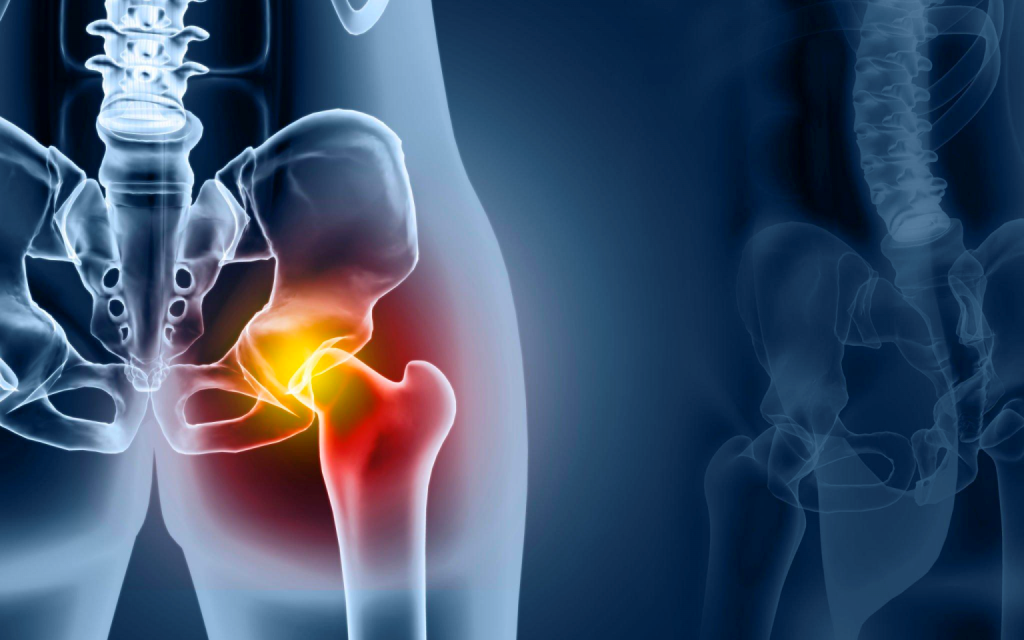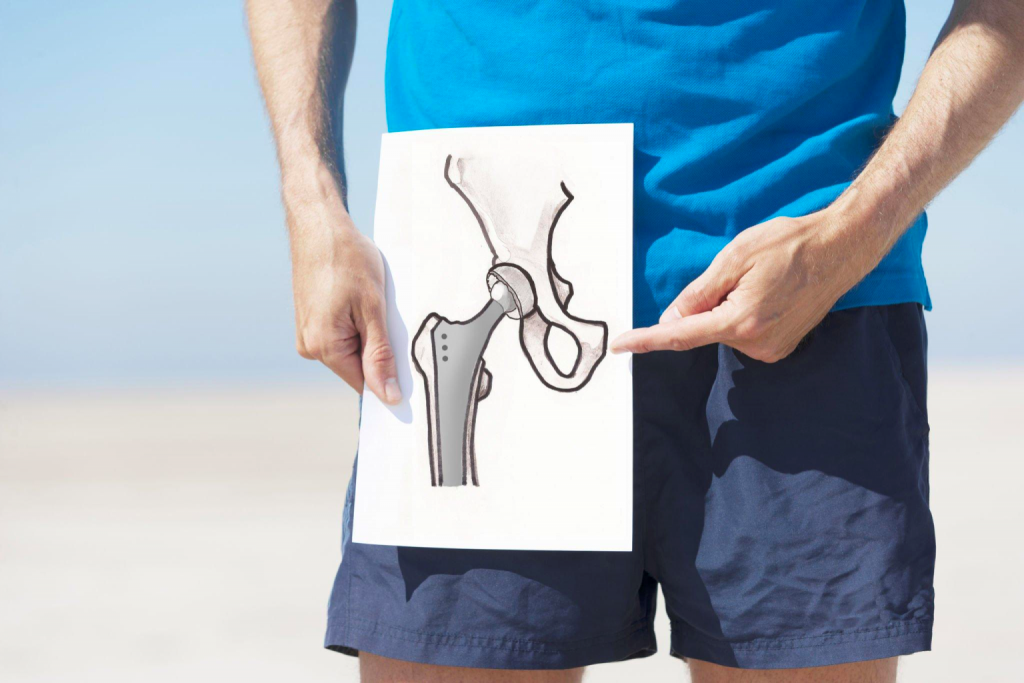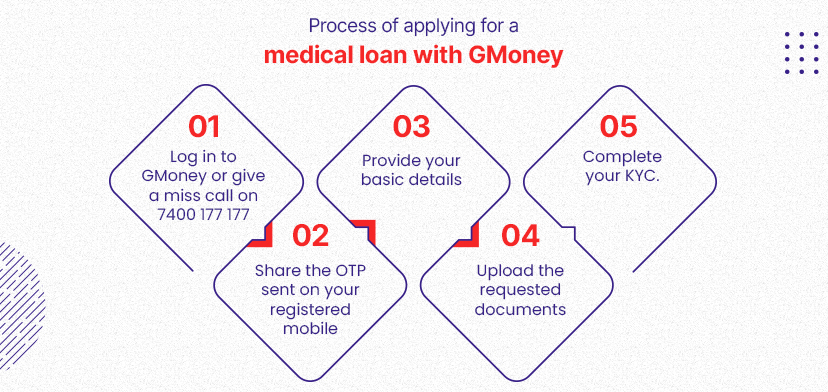Home » Hip replacement surgery in Mumbai: Benefits, risks and cost

If you’re thinking about getting a hip replacement, you probably have a lot of questions and worries. Being in agony from an illness and having nowhere to turn for help can be difficult. Don’t worry though; this site can help you find the solutions you require and will walk you through the hip replacement procedure.
Hip joint inflammation brought on by diseases such arthritis, avascular necrosis, or fractures can result in long-term discomfort. You may require hip replacement surgery if your hip pain does not go away after trying non-surgical options including physical therapy, medication, or lifestyle modifications. Your doctor could suggest hip replacement surgery if other therapies have failed, particularly if your discomfort is limiting your ability to carry out daily tasks. Some patients may benefit from total hip replacement surgery, which entails replacing the complete joint with prosthetic components.

Hip joint pain can result from several different factors, including:
Many people experience hip joint pain, which a hip replacement operation can treat. The stability and connectivity of the bones in the hip joint are improved, and discomfort is significantly reduced, thanks to this surgery. Several people throughout the world have reported a significant reduction in pain after this operation.
An artificial hip joint made of metal and plastic is used to replace the injured hip joint during a hip replacement surgery. A vital weight-bearing joint in the body, the hip joint is made up of the acetabulum socket of the pelvic bone and the femur head. The prosthetic joint is made to move similarly to a real hip joint.
An orthopaedic surgeon operates on a patient to replace their entire hip under general anaesthetic. Hospitalisation for a few days or weeks may be required after the procedure.
By the alleviation of pain and the restoration of mobility, hip replacement surgery seeks to improve the patient’s quality of life. In most cases, this procedure results in a significant decrease in pain and an improvement in the capability to carry out regular activities including walking, running, and climbing stairs. Moreover, some patients might notice improvements in posture, balance, and stability.

Many advantages of hip replacement surgery considerably raise patients’ quality of life. Patients frequently state feeling more energised, independent, and self-sufficient following the operation. They also have a wider range of motion and feel less pain, which improves their balance and standing.
Another advantage that patients who have hip replacement surgery experience is mobility. They are able to move more easily and comfortably, which makes daily tasks like running, walking, and climbing stairs simpler. Formerly challenging sports like riding and swimming are becoming more accessible.
The pain and discomfort brought on by the condition are also reduced by hip replacement surgery. Less stress is placed on adjacent tendons, ligaments, and muscles thanks to the replacement hip joint, which results in less stiffness and discomfort. Patients can move with assurance and ease thanks to the new joint’s improved stability.
Finally, a patient’s confidence may increase after having a hip replacement. With a strong and durable joint, patients can now engage in daily activities and pursue interests that they may have put off before surgery. With the right maintenance and care, this newly discovered confidence can result in a more rewarding existence.

The cost of hip replacement surgery varies based on the city where the procedure is carried out in India, however it can be less expensive than in other nations. For instance, if you choose to have the procedure in Mumbai, hip replacement surgery in Mumbai can cost anything from Rs. 40,000 to Rs. 8,00,000.
Cost of the surgery in other metro cities of India
City
Price Range (Min-Max)
Ahmedabad
Rs. 7000 – Rs. 6,50,000
Bangalore
Rs. 55,000 – Rs. 7,00,000
Chandigarh
Rs. 3,00,000 – Rs. 5,00,000
Chennai
Rs. 90,000 – Rs. 5,00,000
Gurgaon
Rs. 30,000 – Rs. 5,00,000
Hyderabad
Rs. 70,000 – Rs. 8,00,000
Kolkata
Rs. 30,000 – Rs. 5,00,000
Mumbai
Rs. 47,000 – Rs. 8,00,000
New Delhi
Rs. 35,000 – Rs. 8,00,000
Noida
Rs. 70,000 – Rs. 3,00,000
Pune
Rs. 60,000 – Rs. 8,00,000
Hip replacement surgery typically costs between INR 1,50,000 and INR 2,50,000 in India, which can be prohibitive for those who cannot afford the treatment. Moreover, costs for recovery and post-operative care can mount up quickly.
Despite the high costs, patients frequently discover that the procedure’s advantages outweigh the expenditures since they see a significant increase in their quality of life thereafter. For individuals in need, GMoney offers no-cost EMI medical loans for hip replacement surgery.

1. What is hip replacement surgery?
Hip replacement surgery is a medical procedure that involves replacing a damaged or worn hip joint with a prosthetic hip joint. This procedure is typically recommended for patients who have severe hip pain or stiffness that does not respond to other treatments.
2. What are the risks associated with hip replacement surgery?
While hip replacement surgery is generally safe when performed by a qualified and experienced surgeon, there are some risks to be aware of before deciding to undergo the procedure. Potential risks include infection, blood clots, dislocation, and nerve damage.
3. Is there a way to finance hip replacement surgery?
Yes. GMoney offers medical loans for hip replacement surgery that come with no-cost EMI and flexible repayment options, so you can pay without stressing about your budget.
4. What are the advantages of hip replacement surgery?
Hip replacement surgery can lead to improved mobility and quality of life for patients. It can also help relieve chronic pain and stiffness in the hip joint.
5. How much time does it take to recover after hip replacement surgery?
The recovery period for hip replacement surgery can vary, depending on the individual’s age, overall health, and the type of procedure performed. Generally, most patients can expect to return to their normal activities within two to three months after the surgery.
In conclusion, people with hip discomfort and mobility issues can experience a lot of relief after having hip replacement surgery. Many benefits of the procedure include less pain, improved mobility, and an overall higher standard of living. But, it’s important to consider the negative aspects, such as the recovery time and potential difficulties. Also, it’s critical to recognise the risks associated with delaying the procedure as well as the long-term repercussions of untreated hip pain.
Disclaimer: THIS WEBSITE DOES NOT PROVIDE MEDICAL ADVICE.
Follow us
Reach us
Mumbai HO
GMoney Pvt. Ltd.
315, 215 Atrium,
Next to Courtyard by Marriott,,
A.K. Road, Andheri East,
Mumbai - 400093
Ph : +91 86570 00105, +91 72089 60444
Quick Links
Bengaluru
GMoney Technologies Pvt. Ltd.
Oyo Work Spaces, Umiya Emporium,
Opposite Forum Mall, Hosur Rd,
Koramangala, Bengaluru,
Karnataka 560029
Ph : +91 89717 34815
Delhi
GMoney Technologies Pvt. Ltd.
Berry Co Works, 1E/3,
Jhandewalan extension,
Next to jhandewalan metro station
gate no. 2 Barakhambha Road,
New Delhi, Delhi 110001
Ph : +91 97116 26832
Pune
GMoney Technologies Pvt. Ltd.
91 Spring Board, Sky Loft,
Creaticity Mall, Off, Airport Rd,
opposite Golf Course, Shastrinagar,
Yerawada, Pune,
Maharashtra 411006
Ph : +91 84250 28758
Chandigarh
GMoney Technologies Pvt. Ltd.
SCO no. 292,
First Floor, Sector 35D,
Chandigarh
Ph : +91 84279 82012
Jaipur
GMoney Pvt. Ltd.
CODESKK Civil Tower,121 122,
Pandit TN Mishra Marg,
Santhosh Nagar, Nirman Nagar,
Jaipur – 302019
Ahmedabad
GMoney Pvt. Ltd.
22nd Floor, B Block,
Westgate By True Value,
Nr. YMCA Club, SG Highway,
Ahmedabad – 380051
Hyderabad
GMoney Pvt. Ltd.
Dwaraka Pride,
Plot no. 4/1, Survey No. 64,
Huda Techno Enclave, Madhapur,
Hyderabad (Telangana) – 500081
Chennai
GMoney Pvt. Ltd.
DBS Business Center, 31A,
Cathedral Garden Rd, Badrikari, Tirumurthy Nagar, Nungambakkam, Chennai, Tamil
Nadu – 600 034
Mumbai HO
GMoney Pvt. Ltd.
315, 215 Atrium,
Next to Courtyard by Marriott,,
A.K. Road, Andheri East,
Mumbai - 400093
Ph : +91 86570 00105, +91 72089 60444
Bengaluru
GMoney Pvt. Ltd.
Oyo Work Spaces,
Umiya Emporium,
Opp. Forum Mall, Hosur Rd,
Koramangala, Bengaluru,
Karnataka - 560029
Ph : +91 72089 60444
Pune
GMoney Pvt. Ltd.
91 Spring Board, Sky Loft,
Creaticity Mall, Airport Rd,
Opp. Golf Course, Shastrinagar,
Yerawada, Pune,
Maharashtra - 411006
Ph : +91 72089 60444
Delhi
GMoney Pvt. Ltd.
Berry Co Works, 1E/3,
Jhandewalan extension,
Gate no. 2 Barakhambha Road,
New Delhi, Delhi - 110001
Ph :
+91 72089 60444
Chandigarh
GMoney Pvt. Ltd.
SCO No. 292,
First Floor, Sector 35D,
Chandigarh - 160022
Ph : +91 72089 60444
Ahmedabad
GMoney Pvt. Ltd.
22nd Floor, B Block,
Westgate By True Value,
Nr. YMCA Club, SG Highway,
Ahmedabad - 380051
Hyderabad
GMoney Pvt. Ltd.
Dwaraka Pride,
Plot no. 4/1, Survey No. 64,
Huda Techno Enclave, Madhapur,
Hyderabad (Telangana) - 500081
Jaipur
GMoney Pvt. Ltd.
CODESKK Civil Tower,121 122,
Pandit TN Mishra Marg,
Santhosh Nagar, Nirman Nagar,
Jaipur - 302019
Chennai
GMoney Pvt. Ltd.
DBS Business Center, 31A,
Cathedral Garden Rd, Badrikari,
Tirumurthy Nagar,Nungambakkam, Chennai,
Tamil
Nadu - 600 034
Pune | Mumbai | New Delhi | Kolkata | Chennai | Navi Mumbai| Bengaluru | Ahmedabad | Nagpur | Hyderabad | Jaipur | Lucknow | Bhopal | Bhubaneswar | Nashik | Indore | Ghaziabad | Kanpur | Amritsar | Vasai | Noida | Gurugram | Chandigarh | Ranchi | Cuttack | Thane | Kalyan | Jalandhar | Kolhapur | Visakhapatnam | Chakan| Greater Noida | Wagholi | Raipur | Panvel | Belgaum | Mohali | Bhiwandi | Talegaon | Coimbatore | Palghar | Mumbra | Sangli | Surat | Durgapur | Ludhiana | Kochi | Agra | Ahmednagar | Ajmer | Akola | Aurangabad | Baroda | Beed | Rewari | Patiala | Vellore | Ranjangaon | Nanded | Nellore | Panipat | Panjim | Madurai | Mysore | Mangalore | Korba | Mathura | Kalaburagi | Jalgaon | Kharar | Guwahati | Kollam | Jamshedpur | Gwalior | Saswad | Solapur | Varanasi | Salem | Sambalpur | Jodhpur | Hubli | Panchkula | Faridabad | Amravati | Ayodhya | Badlapur | Dehradun | Parbhani | Ujjain | Udaipur | Tiruchirappalli | Srinagar | Shimla | Secunderabad | Ratnagiri | Pandharpur | Ananthapuram | Buldhana | Hadapsar | Baramati | Chittoor | Darjeeling | Dhule | Fatehpur | Gandhinagar | Haridwar | Gorakhpur | Jhansi | Kanchipuram | Kartarpur | Kurukshetra | Pondicherry | Prayagraj | Bharuch | Bhusawal | Bathinda | Pathankot | Nandurbar | Niphad | Kolar | Ambala | Kota | Pendurthi | Jabalpur | Palwal | Bhilai | Bhiwani | Bilaspur | Patna | Rohtak | Phagwara | Malegaon | Vijayawada | Bikaner | Chiplun | Darbhanga | Roorkee | Bhor | Rajahmundry | Margao | Alwar | Dhanbad | Bulandshahr | Aluva | Mulshi | Davanagere | Kapurthala | Anantapur | Loni | Latur | Gondia | Chhindwara | Chandrapur | Dharmapuri-TN | Faridkot | Dharwad | Daund | Chaksu | Bareilly | Kakinada | Haldwani | Doddaballapur | Dindori-MH | Bagru | Kudus | Kozhikode | Gurdaspur | Bokaro | Berhampur | Batala | Barrackpore | Ramgarh | Meerut | Bassi | Dera Bassi | Howrah | Karjat Raigarh | Thiruvananthapuram | Bheemunipatnam | Ambegoan | Allahabad | Aligarh | Alappuzha | Tirupathi | Thoppumpady | Srikakulam | Siliguri | Rourkela | Mirzapur | Gadag | Bellary | Tumkur | Sonipat | Hoshangabad | Junnar | Jalna | Hisar | Karnal | Kottayam | Muzzafarnagar | Ramnagara | Thrissur | Bahadurgarh | Balasore | Baraut | Dhar | Ernakulam | Gadhinglaj | Chikodi | Vaniyambadi | Kamothe |